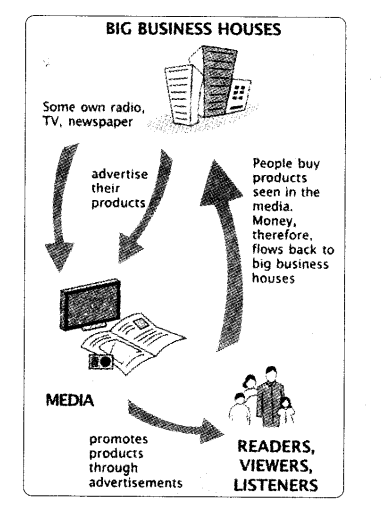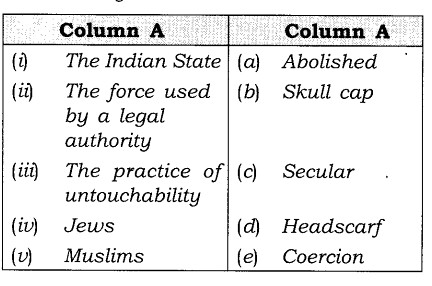EVENTS CONVENT HIGH SCHOOL
05/10/2021 CLASS-7 SESSION 2021-22
SUBJECT :SOCIAL SCIENCE(CIVIC)
CHAPTER-6
UNDERSTANDING MEDIA
______________________________________
1. In what ways does media play an important role in a democracy?
Answer: Media play an important role in democracy in the following ways:
- They make the masses know about certain issues/problems.
- They propagate the policies and programmes of the government.
- They also criticise the unpopular policies and programmes of the government.
- They help in forming the opinion of the masses.
- They also report various crimes and mishappenings, accidents, etc.
- The media also announce the opinions of the public about certain issues/problems etc.
2. Can you give this diagram a title? What do you understand about the link between media and big business from this diagram?

Answer: A title to the above diagram may be given like this—Media and Big Business Houses. Big Business Houses attract people to promote their products through media. It is the best and the cheapest means to reach people at large.
3. You have read about the ways in which the media ‘sets the agenda’. What kind of effect does this have in a democracy? Provide two examples to support your point of view.
Answer:
Media “setting an agenda” has an impact on democracy.
- By focusing on a particular issue the media influences our thoughts and feelings.
- It brings the core issues to light and sometimes even helps get justice for people.
- By setting an agenda, media creates awareness about certain wrongs or the illegal activities happening in the society and makes the government take action.
- Sometimes due to government pressure or due to the influence of big business houses, the balanced may not come out.
- For example: During and after the Commonwealth games media focused on the corruption in giving out the projects, more recently the “Coalgate” issue.
- Bring to light the amount of money secretly stashed in Swiss banks.
4. As a class project, decide to focus on a particular news topic and cut out stories from different newspapers on this. Also, watch the coverage of this topic on TV news, compare two newspapers and write down the similarity—and differences in their reports. It might help to ask the following questions:
(a) What information is this article providing?
(b) What information is it leaving out?
(c) From whose point of view is the article being written?
(d) Whose point of view is being left out and why?
Answer: Students are suggested to do this project themselves.
VERY SHORT ANSWER TYPE QUESTIONS
1. Name various forms of communication.
Answer: Radio, television, newspapers, the Internet.
2. What does the word ‘media’ mean?
Answer: Radio, television, newspapers, the Internet, and several other forms of communication are collectively known as media.
3. Mention any one positive aspect of television.
Answer: Television has enabled us to think of ourselves as members of a larger global world.
4. Mention one way in which the mass media earns money.
Answer: The mass media earns money by advertising different things like cars, clothes, tea, etc.
5.Why are some advertisements shown repeatedly on the television screen? [V. Imp.]
Answer: Same advertisements are shown repeatedly on the television screen just to make people’s minds to go out and buy what is advertised.
6. What are the various ways through which people express their dissatisfaction to any of the government’s decision which does not go in their favour?
Answer: They do so by writing letters to the concerned minister, organising a public protest, starting a signature campaign and asking the government to rethink its programme, etc.
7. What do you mean by a balanced report? [V. Imp.]
Answer: A balanced report is one that discusses all points of view of a particular story and then leaves it to the readers to make up their minds.
8. Why is it necessary for the media to be independent?
Answer: Only then media can write a balanced report.
9. Why does media sometimes focus on a particular aspect of a story?
Answer: It is because the media believes that this will make the story interesting.
10. What does the media’s close relationship with business often mean?
Answer: It means that the media will fail to give a balanced report.
SHORT ANSWER TYPE QUESTIONS
1. How has television brought the world closer to us?
Answer: Television images travel huge distances through satellites and cables. This allows us to view news and entertainment channels from other parts of the world. We see cartoons on our television set which are mostly from Japan and the United States. We can be sitting in Delhi and can see images of Barak Obama’s oath ceremony in the United States. Thus, television has enabled us to think of ourselves as members of a larger global world.
2. Most television channels and newspapers are part of big business houses. Why?
Answer: The technologies that mass media use keep changing and so a lot of money is spent on getting the latest technology. The TV studio in which the newsreader sits has lights, cameras, sound recorders, transmission satellites etc. All of these cost a lot of money.
One thing more, it is not only the newsreader who needs to be paid but also a number of other people who help put the broadcast together. Due to these costs, mass media needs a great deal of money to do its various works. As a result, most television channels and newspapers are part of big business houses.



